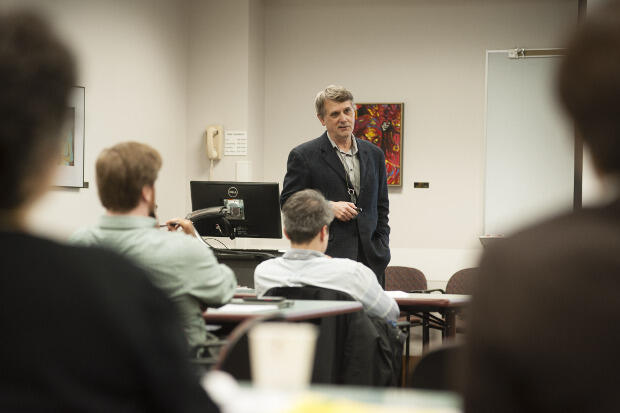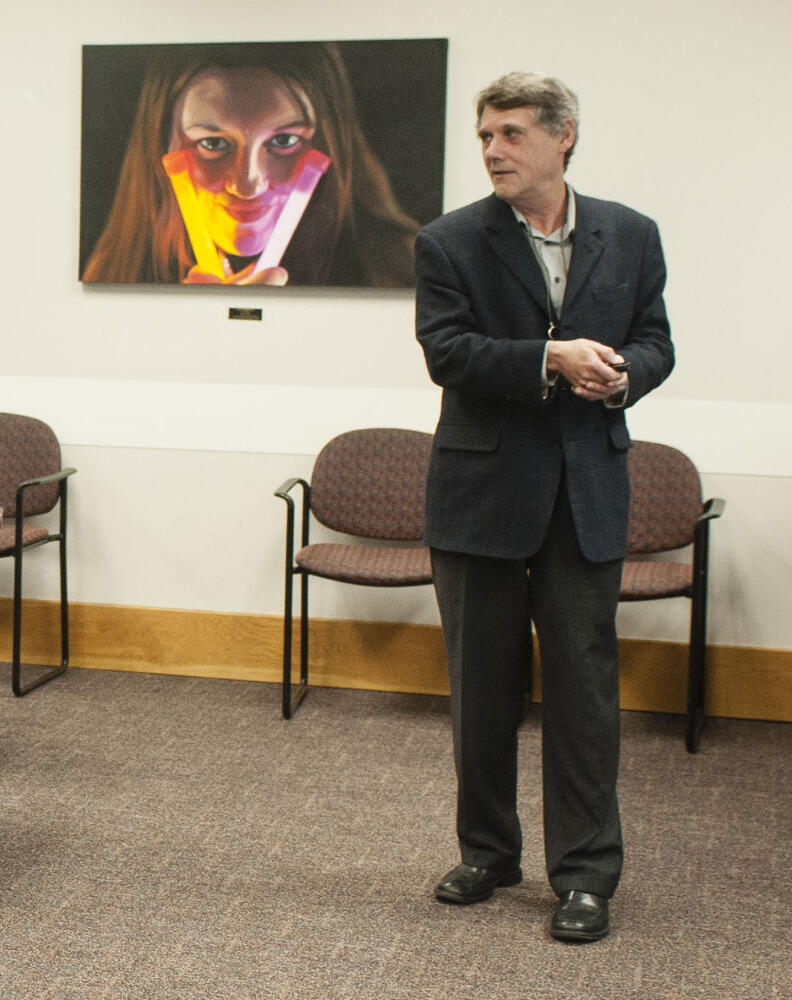
Dec. 1, 2015
Students, residents and physicians at VCU Health use evidence to guide clinical decisions
Share this story
When MRI results revealed that one of Dr. Mark Ryan’s patients at the Hayes E. Willis Health Center was suffering from avascular necrosis of the hip, the physician first recalled what his medical school education had taught him about treating that condition. Traditionally, the disease, which results in death of bone tissue due to a lack of blood supply, is treatable only by hip replacement surgery. “I decided to look into it and try to determine if there were any other options,” Ryan said.
Ryan, an assistant professor in the Department of Family Medicine and Population Health at the Virginia Commonwealth University School of Medicine, opened Essential Evidence Plus on the treatment room laptop. Ryan estimates that he refers to evidence-based, point-of-care clinical decision support systems such as Essential Evidence Plus at least once a day on his smartphone or a laptop in the clinic. With the patient still beside him in the room, Ryan searched for avascular necrosis of the hip on the online database. Within minutes, he was able to sort through the most recent scientific literature on the topic, which was organized according to key points about the disease, diagnosis criteria, treatment options and prognosis summaries.
“I learned that, while it is true that the definitive treatment is hip replacement for people who are symptomatic, there are medications available that are useful at reducing symptoms,” Ryan said. He brought the laptop to the patient’s bedside and showed her what he had found so that together they could decide on which treatment option would be best for her circumstances.
“Evidence-based medicine empowers patients,” Ryan said. “It puts patients increasingly in control of their own health care decisions in a way that would not necessarily be the case in other models of care.”
Ryan was one of more than 30 clinical faculty from VCU Health who participated in a three-day evidence-based medicine conference last week on the MCV Campus. During the workshops, physicians and medical librarians practiced efficiently finding evidence to use in clinical practice and critically appraising medical literature. The conference was led by Dr. Gordon Guyatt, a distinguished professor in the Department of Clinical Epidemiology and Biostatistics at the McMaster University Department of Medicine, who in 1992 coined the phrase “evidence-based medicine” in a Journal of the American Medical Association article.
“With evidence-based medicine comes understanding and always with understanding comes power, in this case, greater effectiveness in helping our patients,” Guyatt said.
An emerging trend
Evidence-based medicine involves using medical literature to effectively guide clinical practice. The model de-emphasizes intuition as sufficient grounds for clinical decision-making, instead stressing the examination of evidence from clinical research.
“Historically, we have experts way behind the evidence, experts making recommendations that contradict the evidence and experts routinely disagreeing with one another,” Guyatt said to a room full of physicians, residents and students at Sanger Hall during a presentation last week titled “Why Bother with Evidence-Based Clinical Practice?”
The idea behind the evidence-based medicine emphasis in the new curriculum is to encourage students to look for good evidence that will directly impact patient care.
When Guyatt asked the audience how many of them had ever used an evidence-based medicine mobile app such as Essential Evidence Plus to guide their practice, everyone in the room raised their hands.
“Increasingly when we are all walking around with mobile devices that can access databases online, it isn’t a game any longer of learning as many facts as possible, it is about teaching people how to think when they find the data,” Ryan said. “To me, that is much more interesting than just memorizing and regurgitating the facts.”
In 2013, the VCU School of Medicine launched a new curriculum that was designed to instruct students on how to think critically. The curriculum redesign included the addition of a longitudinal course called Population Health and Evidence-Based Medicine. Students learn evidence-based medicine and critical review skills in the course that runs through all four years of medical school.
“The idea behind the evidence-based medicine emphasis in the new curriculum is to encourage students to look for good evidence that will directly impact patient care,” Ryan said.
Last May, the Association of American Medical Colleges developed the core Entrustable Professional Activities for Entering Residency, which are 13 activities that medical school graduates should be able to perform on the first day of residency. One of the 13 activities is being able to form clinical questions and retrieve evidence that advances patient care.
“This is where medical education is headed,” said John Cyrus, research and education librarian at Tompkins-McCaw Library on the MCV Campus. “Having one of the EPAs directly address major components of evidence-based medicine is a good indication that it is a central part of what people say is not only essential in the training but also in the practice of physicians.”
Library Rx

During last week’s conference, Cyrus led a workshop on how to stay current with new evidence as it becomes available as opposed to going back and trying to find evidence retroactively. The workshop also included a lesson on how to retrieve evidence quickly.
In his role as a liaison librarian for the School of Medicine and VCU Health physicians, Cyrus works with learners at all levels of medical education to help them identify sources of high-quality information or research that meets their immediate need. He also employs his expertise in using library resources to retrieve evidence for clinical decision-making and to support research projects conducted by residents, fellows and faculty.
“A lot of the education we do focuses on how to get in, get what you need and get out without wasting precious time in the clinical setting,” Cyrus said. “It’s about helping the physicians get the most out of what the library has to offer.”
Cyrus estimates that he handled about 100 consultations this year and led more than 60 education sessions. In addition to working one-on-one with people who come to him for help, he also co-teaches an evidence-based medicine course to third-year medical students and works with third-year psychiatry residents in their evidence-based rotation to teach them about the resources that are available at the library.
In addition to Cyrus, other librarians at the Tompkins-McCaw Library serve the Schools of Pharmacy, Dentistry, Allied Health Professions and Nursing.
“The libraries are a major source for the evidence in the practice of evidence-based medicine,” Cyrus said of the VCU Libraries, which purchase and manage access to the databases of articles, health sciences journals and textbooks that physicians and students use for research. “We provide the tools for physicians to make the right decisions when they need to.”
Patient-focused care
When Ryan graduated from the VCU School of Medicine 15 years ago, he says, the expectations placed on medical students were very different than what they are today.
“Back when I was in medical school we had to carry around in our heads anything that we might need in the moment because we might not get to a computer very quickly, but that isn’t the case anymore,” he said. “It isn’t as useful anymore to just memorize the facts. You still have to learn facts, but it is the way of thinking about them that is more important. That is where evidence-based practice comes into play.”
On handheld devices and screens throughout hospitals and pharmacies, research is now available 24/7 in clinical, life-saving settings. At VCU Health, physicians, residents, students and staff are learning how to think critically and apply the information gleaned from those resources to best care for patients.
“We want to make sure that we are providing good care for people who need it and that we are avoiding excess, unnecessary or potentially harmful care,” Ryan said. “The whole concept of evidence-based medicine is not just finding good evidence for treatment decisions, but also incorporating that evidence into the discussion with the patient to increase their participation in care decisions and put them at the center of the process.”
You still have to learn facts, but it is the way of thinking about them that is more important.
Subscribe to the weekly VCU News email newsletter at http://newsletter.news.vcu.edu/ and receive a selection of stories, videos, photos, news clips and event listings in your inbox every Thursday.
Subscribe to VCU News
Subscribe to VCU News at newsletter.vcu.edu and receive a selection of stories, videos, photos, news clips and event listings in your inbox.











